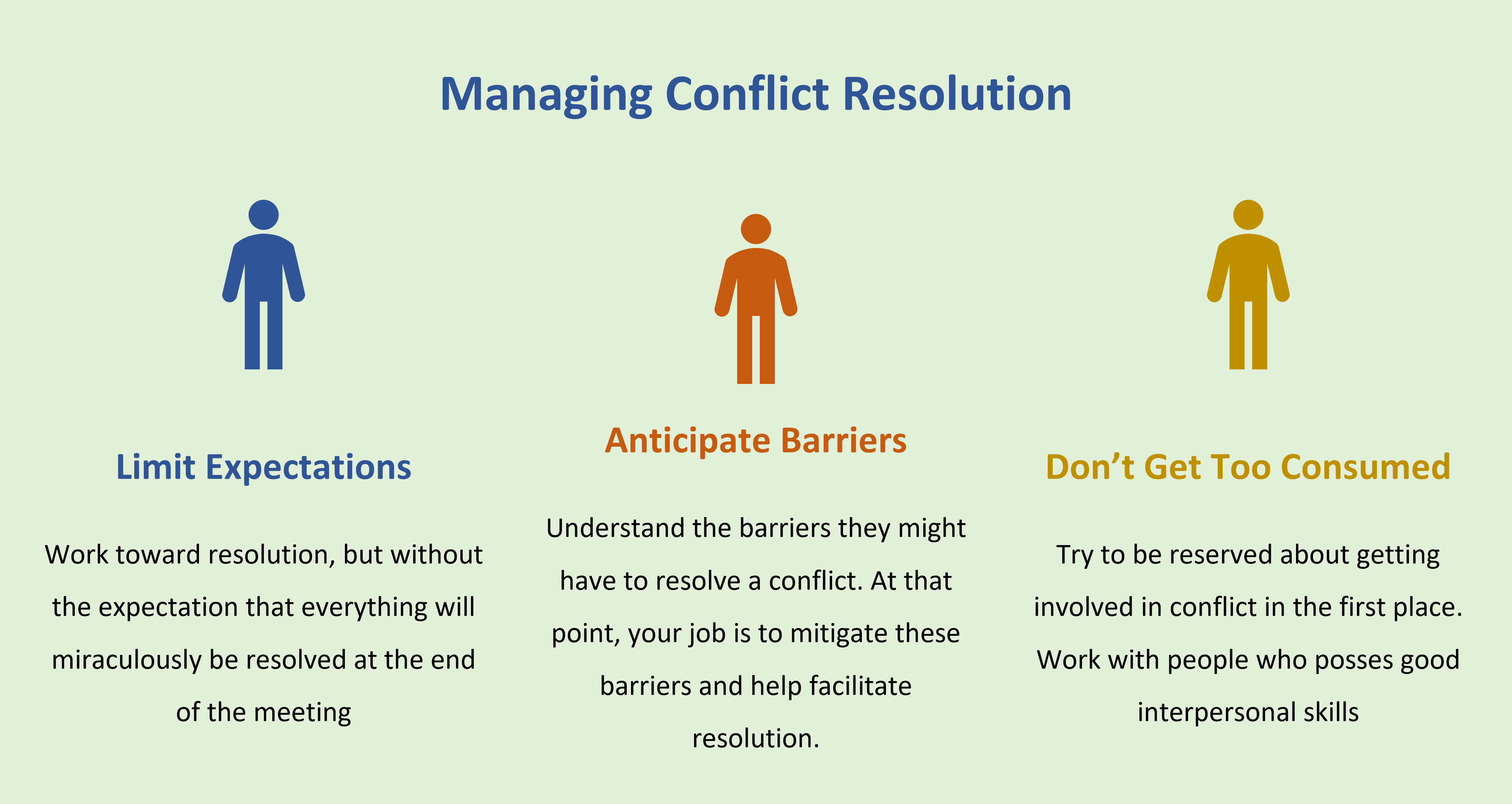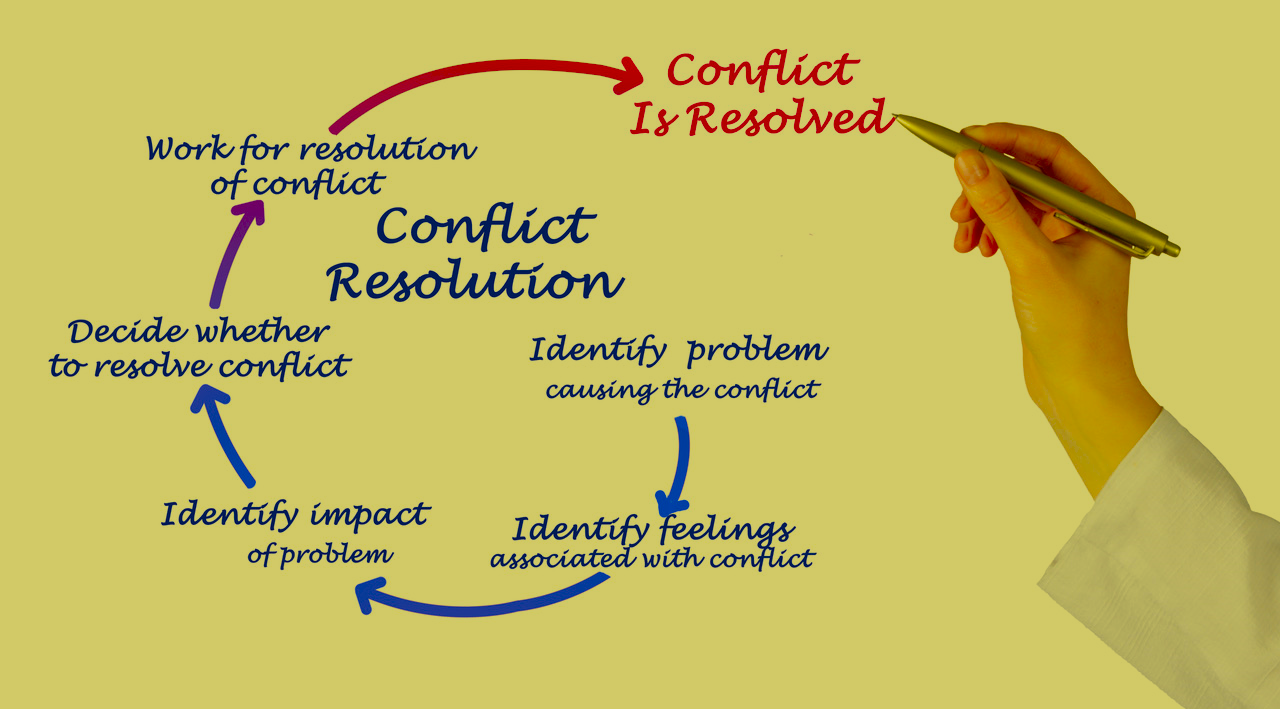Managing Conflicts
Managing Diversity & Conflicts in an organization
Managing diversity in an organization can be a complex process, as it involves understanding and respecting the differences and unique perspectives of individuals from different backgrounds, cultures, and experiences. It can also involve managing potential conflicts that may arise from these differences.
Here are some strategies for managing diversity and conflict in the workplace :
Promote an inclusive culture: Establishing an inclusive culture that values and respects differences can help create a positive and accepting environment where employees feel safe to express themselves.
Provide diversity training: Providing training to employees can help them better understand and appreciate differences in individuals and develop strategies for managing potential conflicts.
Encourage open communication: Encouraging open communication and listening to the perspectives of all employees can help to identify and address potential conflicts before they escalate.
Establish clear expectations: Establishing clear expectations for behavior and communication can help to avoid misunderstandings and potential conflicts.
Encourage collaboration: Encouraging collaboration and teamwork can help individuals learn from each other's perspectives and develop a sense of unity despite their differences.
Foster respect: Foster respect and mutual understanding among employees by promoting an atmosphere of tolerance and empathy.
Address conflicts immediately: Addressing conflicts as soon as they arise can help prevent further escalation and promote a culture of understanding and collaboration.
By implementing these strategies, organizations can effectively manage diversity and conflicts, leading to a more inclusive and positive work environment.

Basic Model for Conflict Resolution
Conflict resolution skills refer to the set of abilities and techniques that individuals use to manage and resolve conflicts in a constructive and effective manner. Some key conflict resolution skills include active listening, clear communication, problem-solving, negotiation, and empathy. These skills are essential for individuals who want to navigate difficult situations and resolve conflicts in a positive and productive way.
Conflict management styles refer to the different approaches that individuals use to manage conflicts. The five main conflict management styles are competing, collaborating, compromising, avoiding, and accommodating. Each style has its own strengths and weaknesses and is appropriate for different situations. By understanding and utilizing different conflict management styles, individuals can effectively manage conflicts and build stronger relationships.
Conflict management strategies refer to the overarching approaches that individuals or organizations use to manage conflicts. These strategies can include a wide range of techniques and practices, such as communication training, conflict resolution training, mediation, negotiation, and team building. The goal of conflict management strategies is to prevent and resolve conflicts in a positive and productive way.
Conflict management techniques refer to the specific tools and practices that individuals or organizations use to manage conflicts. These techniques can include active listening, clear communication, problem-solving, negotiation, and mediation. By utilizing these techniques, individuals can effectively manage conflicts and prevent them from escalating into more serious problems.
Conflict management process refers to the step-by-step approach that individuals or organizations use to manage and resolve conflicts. The conflict management process typically includes several key stages, including identifying the conflict, gathering information, analyzing the situation, developing a plan of action, implementing the plan, and evaluating the results. By following a structured conflict management process, individuals can effectively manage conflicts and prevent them from escalating.
Conflict management tools refer to the various resources and instruments that individuals or organizations use to manage conflicts. These tools can include communication training, conflict resolution training, mediation software, negotiation frameworks, and team building activities. By using conflict management tools, individuals can improve their conflict resolution skills and develop more effective strategies for managing conflicts.
Conflict management training refers to the education and development programs that individuals or organizations use to build conflict resolution skills and enhance conflict management capabilities. These training programs can include courses, workshops, seminars, and coaching sessions. By participating in conflict management training, individuals can learn effective conflict resolution techniques and develop the skills they need to manage conflicts more effectively.
Conflict management systems refer to the structured and integrated approach that organizations use to manage and resolve conflicts. These systems can include policies and procedures, communication channels, training programs, and management structures. By implementing a conflict management system, organizations can create a culture of constructive conflict resolution and prevent conflicts from escalating into more serious problems.
Sample Organization Conflict Resolution Model
Conflict Management Policy
Our organization values open communication and respects the opinions of all individuals. We are committed to resolving conflicts in a fair and respectful manner, and we expect all employees to behave professionally and constructively during conflicts. We recognize that conflicts can arise in any workplace, and we have developed this policy to address and resolve conflicts in a timely and effective manner.
Conflict Management Process
Identify the conflict: The first step in managing a conflict is to identify the issue and the individuals involved.
Define the problem: Once the conflict has been identified, define the problem and gather information about the situation.
Determine the appropriate conflict management style: The appropriate conflict management style will depend on the nature of the conflict, the individuals involved, and the desired outcome.
Develop a plan: Develop a plan to address the conflict and communicate the plan to all parties involved.
Implement the plan: Follow through with the plan and ensure that all parties are working towards a resolution.
Evaluate the outcome: Evaluate the outcome of the conflict management plan and determine if any additional steps are necessary.

Conflict Management System
Our organization has a designated conflict management team that is responsible for managing conflicts within the workplace. The conflict management team is made up of trained professionals who are skilled in conflict resolution and mediation.
Conflict Management Training
All employees are required to participate in conflict management training. The training covers conflict management styles, communication techniques, and conflict resolution strategies.
Conflict Management Method
Our organization uses a collaborative conflict management method that encourages open communication, active listening, and mutual respect. We encourage individuals to work together to find mutually beneficial solutions that meet the needs of all parties involved. We also recognize the importance of confidentiality and ensure that all parties involved in a conflict are treated with respect and dignity.